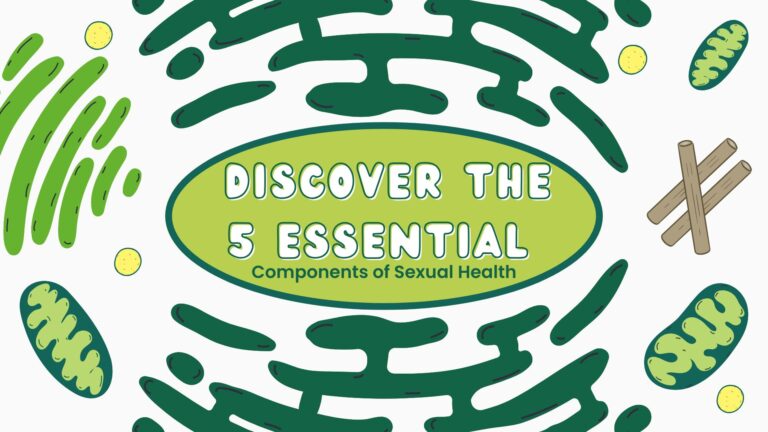Sexual health is an integral part of overall well-being, encompassing not only physical health but also emotional, mental, and social factors. To ensure a fulfilling and safe sexual life, it’s essential to understand the key components that contribute to healthy sexual relationships. In this guide, we will explore the five essential components of sexual health that everyone should be aware of to make informed decisions and maintain their well-being.

1. Consent
Understanding and Practicing Consent
Consent is the cornerstone of healthy sexual interactions. It refers to a mutual agreement between individuals to engage in sexual activity, given freely and enthusiastically by all parties involved. Consent should be:
- Informed and Voluntary: Each person should fully understand what they are agreeing to, without pressure, manipulation, or coercion.
- Continuous: Consent is ongoing, meaning it can be withdrawn at any time, even during the sexual encounter. Always check in with your partner.
- Mutual Respect: Both parties must respect each other’s boundaries and decisions, ensuring that everyone feels comfortable and safe.
Practicing consent not only protects against unwanted advances but also fosters trust, respect, and communication in sexual relationships.
2. Protection from Sexually Transmitted Infections (STIs)
Safe Sex Practices
Protection from sexually transmitted infections (STIs) is an essential component of sexual health. Using barrier methods like condoms or dental dams during sex reduces the risk of transmitting or acquiring infections such as HIV, chlamydia, and gonorrhea.
- Condom Use: Condoms are one of the most effective ways to protect against STIs and unintended pregnancies.
- Regular STI Testing: Routine testing ensures early detection and treatment of infections, preventing complications and reducing the spread of STIs.
- Vaccinations: Vaccines like the HPV vaccine can protect against certain viruses that cause cervical and other cancers.
Practicing safe sex and getting regular health check-ups are vital steps in maintaining sexual health.

3. Emotional and Mental Well-Being
Emotional Aspects of Sexual Health
Sexual health isn’t just about physical well-being—it also involves emotional and mental health. Healthy sexual relationships are built on emotional connection, trust, and communication.
- Self-Esteem and Confidence: A positive body image and confidence in one’s sexual identity contribute to a fulfilling sexual life.
- Communication: Open discussions about desires, boundaries, and concerns can enhance intimacy and reduce anxiety in sexual relationships.
- Mental Health Support: Addressing issues such as stress, anxiety, or trauma related to sexual experiences can significantly improve one’s overall well-being.
Taking care of your mental and emotional health is just as important as physical protection in sexual relationships.
4. Prevention of Unintended Pregnancy
Contraceptive Options
For individuals who are sexually active but not planning to conceive, preventing unintended pregnancies is a critical component of sexual health. Fortunately, there are various contraceptive methods available:
- Hormonal Methods: Birth control pills, patches, and injections are widely used to prevent ovulation and reduce the chances of pregnancy.
- Barrier Methods: Condoms, diaphragms, and cervical caps are barrier methods that block sperm from reaching the egg.
- Long-Acting Reversible Contraceptives (LARCs): These include IUDs and implants, which provide long-term protection and are highly effective.
- Emergency Contraception: In case of contraceptive failure or unprotected sex, emergency contraception (such as the morning-after pill) can prevent pregnancy.
Choosing the right method of contraception depends on personal preferences, health conditions, and lifestyle, so it’s essential to discuss options with a healthcare provider.

5. Healthy Relationships
Building and Maintaining Healthy Sexual Relationships
Healthy sexual relationships are based on respect, trust, and equality. They involve open communication, mutual respect, and shared values. Key aspects of a healthy relationship include:
- Respecting Boundaries: Each partner should feel comfortable setting and respecting boundaries in the relationship.
- Equality: Healthy relationships are built on equal partnership, where both individuals feel heard and valued.
- Communication: Discussing sexual health, boundaries, and preferences with your partner promotes transparency and trust.
In a healthy sexual relationship, both parties feel secure and empowered to express their needs and concerns.
Conclusion
Sexual health involves more than just physical well-being—it encompasses emotional, mental, and relational aspects as well. By understanding and embracing these five essential components—consent, protection from STIs, emotional well-being, prevention of unintended pregnancy, and healthy relationships—you can cultivate a safe, fulfilling, and respectful sexual life. Prioritizing sexual health not only benefits your overall well-being but also promotes healthier, more meaningful connections with others.
FAQs
How often should I get tested for STIs?
It is recommended to get tested for STIs at least once a year if you are sexually active, or more frequently if you have multiple partners or engage in high-risk behaviors.
What should I do if I’m not ready for sexual activity but feel pressured?
It's important to communicate your feelings and set clear boundaries. If you feel uncomfortable, seek support from friends, family, or a trusted counselor to help navigate the situation.
Can I use emergency contraception after unprotected sex?
Yes, emergency contraception (such as the morning-after pill) can be used to prevent pregnancy after unprotected sex or contraceptive failure. It should be taken as soon as possible for maximum effectiveness.
How can I build a healthy sexual relationship with my partner?
Open communication, mutual respect, and trust are key. Discussing boundaries, sexual health, and emotional needs helps foster a healthy, supportive relationship.


